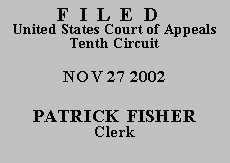

| UNITED STATES OF AMERICA,
Plaintiff - Appellee, v. LENARD CHAUNCY DIXON, also known as Na-Na, Defendant - Appellant. |
98-CR-40034-02-RDR |
After examining the briefs and appellate record, this panel has determined unanimously that oral argument would not materially assist the determination of this appeal. See Fed. R. App. P. 34(a)(2); 10th Cir. R. 34.1(G). The case is therefore ordered submitted without oral argument.
Lenard Dixon, a federal prisoner appearing pro se, seeks a certificate of appealability to appeal the district court's denial of his 28 U.S.C. § 2255 motion. We deny his request and dismiss the appeal.
Dixon was convicted in 1998 of conspiracy to commit a carjacking, carjacking, and use of a firearm during and in relation to a crime of violence. His convictions were affirmed on appeal and the Supreme Court denied review. Dixon filed his § 2255 on April 16, 2001, alleging (1) the district court lacked subject matter jurisdiction to impose judgment because of recent Supreme Court decisions regarding interstate commerce; (2) he received ineffective assistance of trial and appellate counsel; and (3) his sentence must be vacated due to a change in the Sentencing Guidelines. On April 15, 2002, the district court denied relief. Dixon filed an application for certificate of appealability in district court on June 17, 2002 (the certificate of mailing indicates it was mailed on June 7, 2002), which was denied on June 21, 2002. He then filed a notice of appeal on August 12, 2002. Dixon's application for a certificate of appealability is "the functional equivalent of a notice of appeal." See Ray v. Cowley, 975 F.2d 1478, 1479 (10th Cir. 1992). Although it was not timely filed, it is considered timely because the certificate of service indicates the application was timely mailed. See id.
On appeal, Dixon argues (1) recent Supreme Court decisions relating to violations of interstate commerce require that his convictions and sentences be vacated; (2) he was denied effective assistance of counsel because he was not advised that he had a right to testify; and (3) key elements were omitted from the indictment and his counsel was ineffective for failing to move for dismissal because of the omissions.
Dixon's argument that the carjacking statute, 18 U.S.C. § 2119, exceeded Congress' authority under the Commerce Clause and "can no longer pass constitutional scrutiny" is without merit. In United States v. Morrison, 529 U.S. 598 (2000), the Court held that portions of the Violence Against Women Act exceeded Congress' Commerce Clause power, concluding Congress may not regulate "noneconomic, violent criminal conduct based solely on that conduct's aggregate effect on interstate commerce." Id. at 617. Section 2119 criminalized particular carjackings based not solely upon the aggregate effect of carjackings but rather upon an individualized determination that the automobile in question "has been transported, shipped, or received in interstate or foreign commerce." 18 U.S.C. § 2119. Section 2119 remains constitutional after Morrison. See United States v. Taylor, 226 F.3d 593, 598-600 (7th Cir. 2000).
The district court found that even if Dixon had testified, the result of his trial would not have changed. Dixon argued that his testimony would prove he did not carry or use a firearm "in accordance with the carjacking offenses." The district court determined that Dixon was convicted of using a firearm carried by his accomplice, and that Dixon did not assert that he would testify that his accomplice was unarmed. Dixon has failed to contradict the district court's conclusion that, even assuming he received ineffective assistance of counsel, he was not prejudiced by his failure to testify.
Dixon has abandoned his final argument raised before the district court -- that his sentence must be vacated due to a change in the Sentencing Guidelines. Instead, Dixon alleges that the indictment's failure to invoke 18 U.S.C. § 2 resulted in his conviction on a charge where essential elements were not alleged in the indictment. This argument was not raised before the district court and we will not address it on appeal. See United States v. Mora, 293 F.3d 1213, 1216 (10th Cir. 2002).
As Dixon has not made a "substantial showing of the denial of a constitutional right (28 U.S.C. § 2253(c)(2)), we DENY a certificate of appealability and DISMISS the appeal. The mandate shall issue forthwith.
Entered for the Court
Mary Beck Briscoe
Circuit Judge
*.This order and judgment is not binding precedent, except under the doctrines of law of the case, res judicata, and collateral estoppel. The court generally disfavors the citation of orders and judgments; nevertheless, an order and judgment may be cited under the terms and conditions of 10th Cir. R. 36.3.